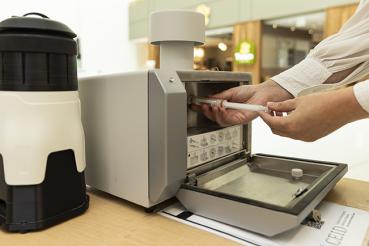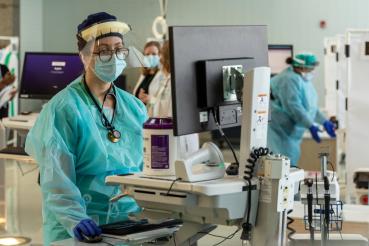Vaccines for COVID-19 have performed extremely well in carefully controlled clinical trials. Now an effort led by the federal Centers for Disease Control and Prevention is underway at hospitals nationwide, including Rush University Medical Center, to determine how effective the vaccines are in the “real world” of everyday life.
The question of vaccine efficacy is critical, and now that more than 10 million people in the United States have received at least one dose of either of the vaccines developed by the pharmaceutical companies Pfizer and Moderna, the opportunity has emerged to see how they will perform under typical conditions. For example, people vaccinated in the general population will likely have different medical conditions than those who participated in the vaccines’ clinical trials.
Health care personnel, who were among the first to be vaccinated once the vaccines received Emergency Use Authorizations from the U.S. Food and Drug Administration, provide the very first opportunity for the U.S. to assess COVID-19 vaccines’ effectiveness in ordinary life. Rush infectious disease experts are working with the CDC and other medical centers across the country to make that assessment.
“With a majority of our frontline care providers vaccinated at Rush, we have an important opportunity and responsibility to help evaluate the real-world effectiveness of the vaccine,” said Dr. Michael Lin, an infectious diseases specialist and epidemiologist at the Medical Center.
Rush is among the more than 34 medical centers in the U.S. that will work with the CDC to determine whether inoculation with a COVID-19 vaccine is associated with health care personnel being more likely to test negative for COVID-19 when they experience flu-like symptoms. The researchers also will assess whether COVID-19 vaccines are associated with milder symptoms among health care personnel who do test positive for COVID-19 infection.
For this study, selected health care personnel at the Medical Center who undergo COVID-19 testing because of symptoms will be invited two weeks after their test to complete a brief CDC-designed survey about their symptoms and medical care.
Lin emphasized that until more is known about the vaccines’ effectiveness, and enough of the general population is vaccinated to achieve herd immunity, everyone should continue with safety precautions regardless of their personal vaccination status. “The COVID-19 vaccines are excellent but are not 100% protective,” he said. “So for now, all COVID-19 vaccine recipients must follow COVID-19 prevention measures such as masking, handwashing, and social distancing, and continue seeking COVID-19 testing if they develop COVID-19-like symptoms.”





